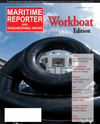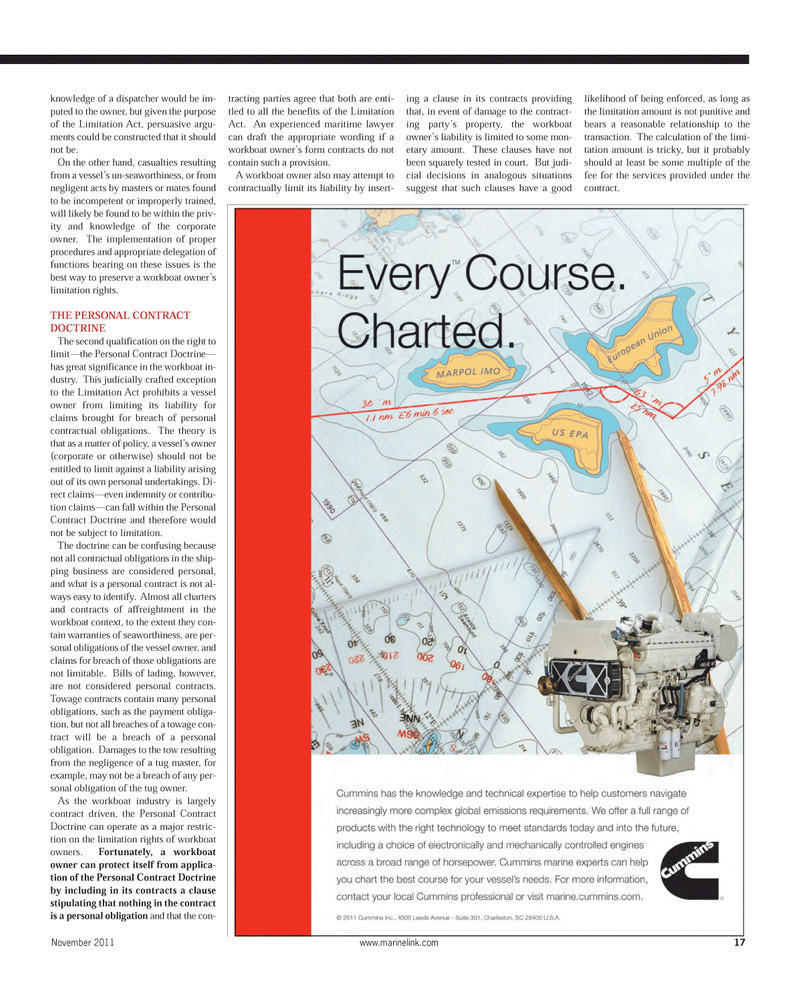
Page 17: of Maritime Reporter Magazine (November 2011)
Feature: Workboat Annual
Read this page in Pdf, Flash or Html5 edition of November 2011 Maritime Reporter Magazine
knowledge of a dispatcher would be im- puted to the owner, but given the purpose of the Limitation Act, persuasive argu- ments could be constructed that it shouldnot be.On the other hand, casualties resultingfrom a vessel?s un-seaworthiness, or from negligent acts by masters or mates found to be incompetent or improperly trained,will likely be found to be within the priv- ity and knowledge of the corporate owner. The implementation of proper procedures and appropriate delegation of functions bearing on these issues is thebest way to preserve a workboat owner?s limitation rights.THE PERSONAL CONTRACT DOCTRINEThe second qualification on the right to limit?the Personal Contract Doctrine?has great significance in the workboat in- dustry. This judicially crafted exception to the Limitation Act prohibits a vessel owner from limiting its liability for claims brought for breach of personalcontractual obligations. The theory is that as a matter of policy, a vessel?s owner (corporate or otherwise) should not beentitled to limit against a liability arising out of its own personal undertakings. Di- rect claims?even indemnity or contribu- tion claims?can fall within the Personal Contract Doctrine and therefore would not be subject to limitation.The doctrine can be confusing becausenot all contractual obligations in the ship- ping business are considered personal, and what is a personal contract is not al-ways easy to identify. Almost all charters and contracts of affreightment in the workboat context, to the extent they con- tain warranties of seaworthiness, are per- sonal obligations of the vessel owner, and claims for breach of those obligations are not limitable. Bills of lading, however, are not considered personal contracts.Towage contracts contain many personal obligations, such as the payment obliga- tion, but not all breaches of a towage con- tract will be a breach of a personalobligation. Damages to the tow resulting from the negligence of a tug master, for example, may not be a breach of any per- sonal obligation of the tug owner. As the workboat industry is largely contract driven, the Personal Contract Doctrine can operate as a major restric-tion on the limitation rights of workboat owners. Fortunately, a workboat owner can protect itself from applica- tion of the Personal Contract Doctrine by including in its contracts a clausestipulating that nothing in the contractis a personal obligation and that the con-tracting parties agree that both are enti-tled to all the benefits of the Limitation Act. An experienced maritime lawyer can draft the appropriate wording if a workboat owner?s form contracts do not contain such a provision. A workboat owner also may attempt to contractually limit its liability by insert-ing a clause in its contracts providing that, in event of damage to the contract- ing party?s property, the workboat owner?s liability is limited to some mon- etary amount. These clauses have not been squarely tested in court. But judi-cial decisions in analogous situationssuggest that such clauses have a good likelihood of being enforced, as long as the limitation amount is not punitive and bears a reasonable relationship to thetransaction. The calculation of the limi- tation amount is tricky, but it probably should at least be some multiple of thefee for the services provided under the contract. November 2011www.marinelink.com 17MR Nov.11 # 2 (10-17):MR Template 10/27/2011 10:52 AM Page 17

 16
16

 18
18
